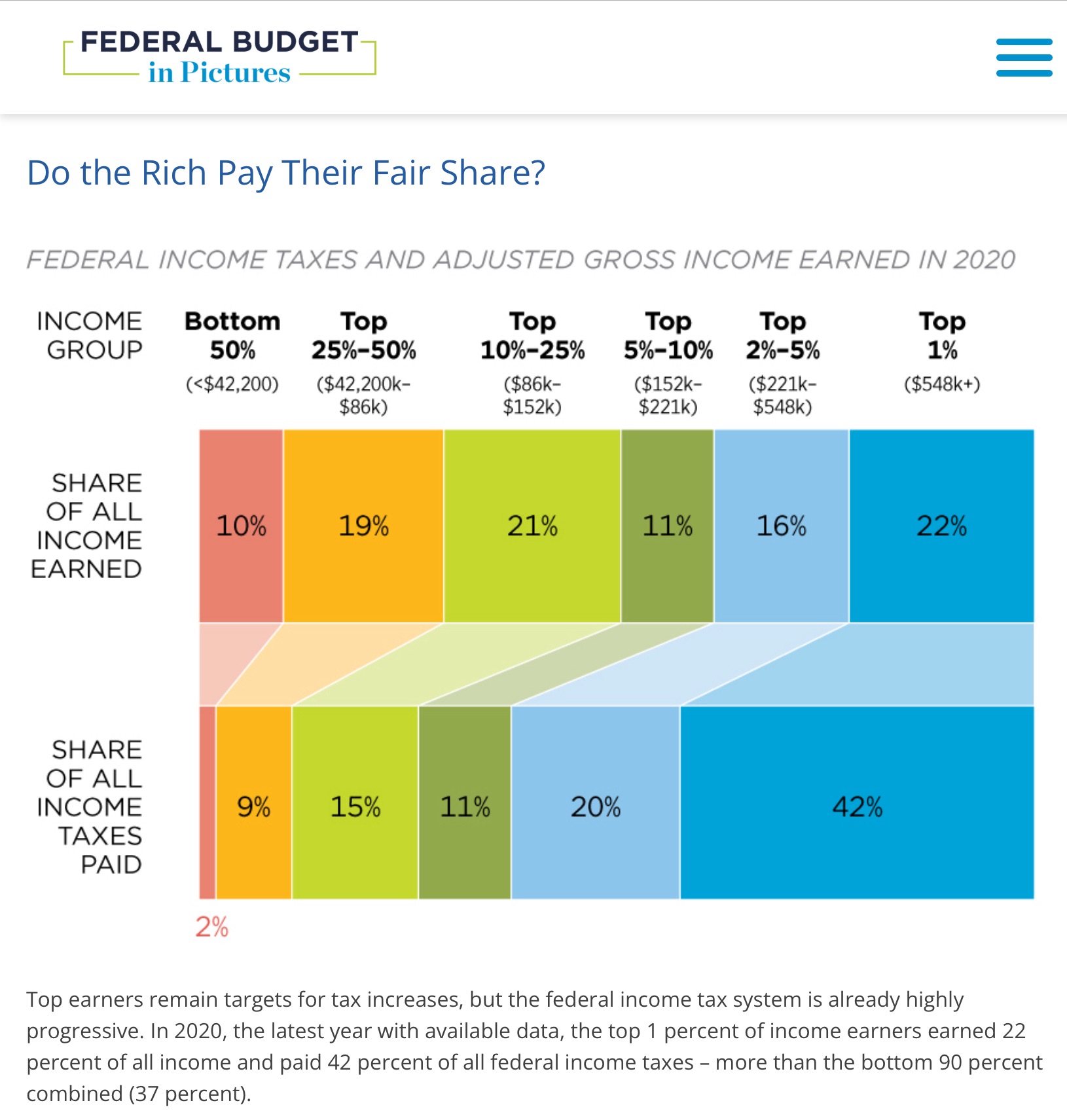“Tax the rich!” is a favorite cry of the political left – and its dangerous. If you want strong social programs similar to say, Scandinavia, the cost must be allocated among all citizens. That is the only way to give everyone a stake in what is spent and how. It is the only way people will care about what they receive for their money.
Even more bizarre is the call to tax unrealized income – tax the paper value of the growth in investments before the asset has been sold and proceeds received. The nonsense of this would appear obvious. Your stocks appreciate $100,000 in 2024 and you are taxed on that. However, in 2025 the same stock depreciates $100,000, now what? Do you get a refund?
Then there is the call for a wealth tax, a tax on the net worth of a person more or less. But even defining that is a game and the decline in the amount from year to year is likely.
Everyone, not just the rich or wealthy, must have a stake in how government spends and where it comes from.
There are nearly 800 billionaires in the US. That is clearly wealthy.
However, there’s no single definition of how much money or possessions makes someone wealthy. It can depend on factors like location, lifestyle, and personal values. Someone living comfortably with a modest income in a low-cost area might feel wealthy, while someone with a high income in a very expensive city might not.
Anyone who earns or has accumulated more assets than you might seem wealthy.
Here is how the Scandinavians with their liberal social safety net do it.
Scandinavian countries, which include Denmark, Norway, and Sweden, rely on a mix of taxes to fund their extensive social programs:
- Income Tax: This is a progressive tax, meaning those who earn more pay a higher percentage of their income. The top rates apply to a broader range of earners compared to the United States, so even middle-class earners face higher income taxes.
- Social Security Contributions: These are typically paid by both employers and employees and fund the social safety net, including healthcare, unemployment benefits, and pensions.
- Value-Added Tax (VAT): This is a consumption tax similar to a sales tax, applied to goods and services at each stage of production. While VAT rates are high in Scandinavia, some essentials like groceries may be exempt.
- Corporate Tax: Corporate tax rates in Scandinavia are generally around the OECD average, lower than the U.S.rate.
Here’s a breakdown of some key points to remember:
- Income tax starts hitting people at a lower income threshold than in the U.S.
- VAT rates are high, but some necessities may be exempt.
- Social security contributions are shared by employers and employees.
- Corporate tax rates are moderate.



How do we collect taxes on a Picasso hanging in your living room? Mickey Mantle rookie baseball card in your desk? The two antique cars in mint condition in the garage? The gold coins hidden away awaiting Armageddon?
A simple flat tax with the first $50,000 or $55,000 exempt. Most of the countries spun out of the Soviet orbit in 1989 adopting a version of the flat tax. Tell me what greater government services the wealthy get that the less wealthy don’t? I pay taxes for the services I receive–I deserve no more or less based on my income. Fortunately I use less while others use far more–no problem here as that’s the way it should be.
We all know that a wealth tax is pushed by the left who seemingly want every dollar we have. Like we have seen recently they are hell bent on buying votes.
Same folks who told us we would be better off “rediscovering policing” , ignoring the border invasion, and big city crime is just in your imagination.
LikeLike
I liked this article from the Economist
How to tax billionaires—and how not to
https://econ.st/4be8TOf
LikeLike
I read the article and it is provocative. Worth a discussion about no doubt about it.
LikeLike
The progressive tax code is appropriate. However, at both extremes it’s broken. Come up with a figure at the high end and tax it even more progressively. There is a point at which it becomes quite obscene. Maybe >$1MM?, maybe $2MM? You should be able to still keep a lot of your earnings but it becomes more of a numbers game with hyper wealth.
A flat tax is wrong but I believe a minimum tax makes sense, too. There’s no reason that a some folks contribute $0 on their 1040, possibly either getting cash back and using federal services along the way. If everyone tossed in $10/month, $120/year, it would go pretty far if that estimate of nearly half the people don’t pay any federal income tax.
Spending needs to be addressed, too. Raise a dollar if you can reduce spending a dollar. Then we’d make real progress
LikeLike
The solution is simple. If you feel put upon by paying a higher share of taxes on a higher income, just earn at the same level of the bottom 50%. I’m sure someone else would gladly take your place in the top bracket.
LikeLike
But that’s not the point. Should wealth be taxed, unearned income be taxed – on anyone?
LikeLike
I’m not an expert on the tax code or taxation, but I see a tax on accumulated wealth as unworkable. If the wealth spins off dividends or rents then that should be taxed. I believe the tax code handles it already as it does capital gains.
LikeLike